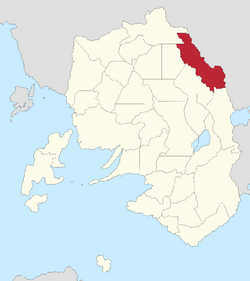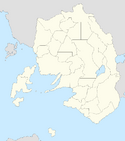Eastvale: Difference between revisions
m Text replacement - "Ionian Highlands" to "Ionian Plateau" |
m Text replacement - "Concilium Daoni" to "Conshilía Daoni" |
||
| (6 intermediate revisions by the same user not shown) | |||
| Line 21: | Line 21: | ||
| leader_title = Governor | | leader_title = Governor | ||
| leader_name = John Peera | | leader_name = John Peera | ||
| population_as_of = | | population_as_of = 2030 | ||
| population_total = | | population_total = 6,824,537 | ||
| density = 160/sq mi | | density = 160/sq mi | ||
}} | }} | ||
'''Eastvale''', is a [[Government of Urcea#Province|province]] in the eastern [[Urcea|Apostolic Kingdom of Urcea]]. It comprises the most recently acquired territory in metropolitan [[Urcea]], having been ceded to [[Urcea]] following the [[Third Caroline War]]. It holds the distinction of being the only territory held by Urcea prior to 1892 that never advanced beyond the stage of [[Government of Urcea#Overseas%20Possessions|Rectory]] and additionally holds the distinction of having a self-identified population of [[Derian people]] ranging from 10% to 25%, making it the largest percentage population of Derians in Urcea. | '''Eastvale''', is a [[Government of Urcea#Province|province]] in the eastern [[Urcea|Apostolic Kingdom of Urcea]]. Eastvale is considered part of Urcea's [[Transionia]] region. It comprises the most recently acquired territory in metropolitan [[Urcea]], having been ceded to [[Urcea]] following the [[Third Caroline War]]. It holds the distinction of being the only territory held by Urcea prior to 1892 that never advanced beyond the stage of [[Government of Urcea#Overseas%20Possessions|Rectory]] and additionally holds the distinction of having a self-identified population of [[Derian people]] ranging from 10% to 25%, making it the largest percentage population of Derians in Urcea. | ||
== History == | == History == | ||
=== Aedanicad period === | === Aedanicad period === | ||
{{Main|Transionia#History}} | |||
The rise of [[Gréagóir FitzRex]] as Crown-Regent and the end of the [[Aedanicad]] would have major repercussions for Eastvale. The [[Administrative Reorganization Act of 1892]] provided that the vast majority of the Rectory for the Eastern Valley would be incorporated as a single [[Government of Urcea#Province|province]], the new administrative form of the Kingdom with peripheral regions becoming part of the new province of [[Burgundiemarch]]. The Rectory was formally dissolved on 1 August 1892 and became the first provincial government to begin operation in [[Urcea]]. The first elections took place in 1895, but like elsewhere in the nation, were mired in accusations of intimidation, ballot stuffing, and fraud. Pro-Fitzrex independents took control of the provincial government and [[Conshilía Daoni]] delegation from the province. The fifteen Regal Army divisions were reinforced to thirty divisions due to FitzRex's anti-[[Holy Levantine Empire]] foreign policy, and the Regal Army began to construct a line of fortifications facing [[Dericania]]. During the [[Red Interregnum]], these fortifications were highly effective against Deric forces. However, [[Ionian Plateau|Ionian]] Highlanders loyal to [[House de Weluta]] infiltrated the province with ease and launched a lengthy insurgent campaign with local assistance. News of the [[Overland Campaign]] required a concentration of forces in [[Burgundiemarch]], leaving just five divisions to hold Eastvale. Ionian highlanders and local militias outnumbered Regal Army forces, and following a short campaign the Regal Army surrendered Fort St. Andrew on 15 July 1899. Eastvale was the third province to fall to Legitimist forces - South Ionia and North Ionia preceded it - and it provided an important supply route from [[Dericania]] to the Ionian provinces. | |||
The rise of [[Gréagóir FitzRex]] as Crown-Regent and the end of the [[Aedanicad]] would have major repercussions for Eastvale. The [[Administrative Reorganization Act of 1892]] provided that the vast majority of the Rectory for the Eastern Valley would be incorporated as a single [[Government of Urcea#Province|province]], the new administrative form of the Kingdom with peripheral regions becoming part of the new province of [[Burgundiemarch]]. The Rectory was formally dissolved on 1 August 1892 and became the first provincial government to begin operation in [[Urcea]]. The first elections took place in 1895, but like elsewhere in the nation, were mired in accusations of intimidation, ballot stuffing, and fraud. Pro-Fitzrex independents took control of the provincial government and [[ | |||
=== 20th and 21st centuries === | === 20th and 21st centuries === | ||
== Geography == | == Geography == | ||
{{Template:Urcea geography sidebar}} | |||
=== Cities and towns === | === Cities and towns === | ||
{| class="wikitable" | {| class="wikitable" | ||
| Line 106: | Line 102: | ||
Other (3.4%) | Other (3.4%) | ||
== Government == | |||
=== Politics === | |||
As of the 2030s, Eastvale is decisively a [[Solidarity Party (Urcea)|Solidarity]] province. However, prior to the [[2025 Urcean elections]], the province was highly competitive between the monarchist, Ionian-oriented [[Julian Party (Urcea)|Julian Party]] and far-left parties such as the [[Social Labor Party (Urcea)|Social Labor Party]] and its predecessors. These parties, though strictly opposed to one another, both reflected an anti-centralism common in [[Transionia]]n politics. Both parties in Eastvale specifically typically campaigned on a strong anti-[[Urceopolis (City)|Urceopolis]] message. In the [[2015 Urcean elections]], Social Labor won 3 of 4 seats with the Julians winning the remainder. After the collapse of the left-wing parties and the creation of the merged Solidarity Party, both monarchists and left-wing anti-centralists coalesced behind the Solidarity Party, which now controls all Daoni seats, supermajorities in the provincial legislature, and the governor's office. In the [[2030 Urcean elections]], incumbent Solidarity Procurator [[Livio Iarnán]] defeated his [[National Pact (Urcea)|Pact]] opponent 63% to 35%. Efforts to build a regionalist left-wing party in Eastvale have largely failed, and the alleged "urbanite and erudite" reputation of the [[Working Families Party (Urcea)|Working Families Party]] has turned most Eastvaleyards away from the party. | |||
== Sports == | |||
[[Category: Urcea]] | [[Category: Urcea]] | ||
[[Category: Subdivisions of Urcea]] | [[Category: Subdivisions of Urcea]] | ||
[[Category:IXWB]] | [[Category:IXWB]] | ||
Latest revision as of 14:04, 4 September 2024
This article is a work-in-progress because it is incomplete and pending further input from an author. Note: The contents of this article are not considered canonical and may be inaccurate. Please comment on this article's talk page to share your input, comments and questions. |
Script error: The module returned a nil value. It is supposed to return an export table.
Province of Eastvale | |
|---|---|
 Location of the Province of Eastvale | |
| Country | Urcea |
| Cathedral City | Fort St. Andrew |
| Government | |
| • Governor | John Peera (S) |
| Population (2030) | |
| • Total | 6,824,537 |
Eastvale, is a province in the eastern Apostolic Kingdom of Urcea. Eastvale is considered part of Urcea's Transionia region. It comprises the most recently acquired territory in metropolitan Urcea, having been ceded to Urcea following the Third Caroline War. It holds the distinction of being the only territory held by Urcea prior to 1892 that never advanced beyond the stage of Rectory and additionally holds the distinction of having a self-identified population of Derian people ranging from 10% to 25%, making it the largest percentage population of Derians in Urcea.
History
Aedanicad period
The rise of Gréagóir FitzRex as Crown-Regent and the end of the Aedanicad would have major repercussions for Eastvale. The Administrative Reorganization Act of 1892 provided that the vast majority of the Rectory for the Eastern Valley would be incorporated as a single province, the new administrative form of the Kingdom with peripheral regions becoming part of the new province of Burgundiemarch. The Rectory was formally dissolved on 1 August 1892 and became the first provincial government to begin operation in Urcea. The first elections took place in 1895, but like elsewhere in the nation, were mired in accusations of intimidation, ballot stuffing, and fraud. Pro-Fitzrex independents took control of the provincial government and Conshilía Daoni delegation from the province. The fifteen Regal Army divisions were reinforced to thirty divisions due to FitzRex's anti-Holy Levantine Empire foreign policy, and the Regal Army began to construct a line of fortifications facing Dericania. During the Red Interregnum, these fortifications were highly effective against Deric forces. However, Ionian Highlanders loyal to House de Weluta infiltrated the province with ease and launched a lengthy insurgent campaign with local assistance. News of the Overland Campaign required a concentration of forces in Burgundiemarch, leaving just five divisions to hold Eastvale. Ionian highlanders and local militias outnumbered Regal Army forces, and following a short campaign the Regal Army surrendered Fort St. Andrew on 15 July 1899. Eastvale was the third province to fall to Legitimist forces - South Ionia and North Ionia preceded it - and it provided an important supply route from Dericania to the Ionian provinces.
20th and 21st centuries
Geography
| This article is part of a series on the |
| Geography of Urcea |
|---|
 |
Cities and towns
| Rank | City | Population |
|---|---|---|
| 1 | New Carsula | 1,596,401 |
| 2 | Batania | 1,492,403 |
| 3 | Fort St. Andrew | 450,401 |
| 4 | Aballo | 394,105 |
| 5 | New Almás | 377,405 |
| 6 | Condate | 296,703 |
| 7 | Solva | 274,396 |
| 8 | Almus | 139,194 |
| 9 | Carsula | 82,051 |
| 10 | Mevania | 55,105 |
Economy
Demographics
Self-reported ethnic origin (2015):
Urcean (72.4%)
Derian (17.8%)
Ænglish (4.2%)
Gassavelian (2.2%)
Other (3.4%)
Government
Politics
As of the 2030s, Eastvale is decisively a Solidarity province. However, prior to the 2025 Urcean elections, the province was highly competitive between the monarchist, Ionian-oriented Julian Party and far-left parties such as the Social Labor Party and its predecessors. These parties, though strictly opposed to one another, both reflected an anti-centralism common in Transionian politics. Both parties in Eastvale specifically typically campaigned on a strong anti-Urceopolis message. In the 2015 Urcean elections, Social Labor won 3 of 4 seats with the Julians winning the remainder. After the collapse of the left-wing parties and the creation of the merged Solidarity Party, both monarchists and left-wing anti-centralists coalesced behind the Solidarity Party, which now controls all Daoni seats, supermajorities in the provincial legislature, and the governor's office. In the 2030 Urcean elections, incumbent Solidarity Procurator Livio Iarnán defeated his Pact opponent 63% to 35%. Efforts to build a regionalist left-wing party in Eastvale have largely failed, and the alleged "urbanite and erudite" reputation of the Working Families Party has turned most Eastvaleyards away from the party.
